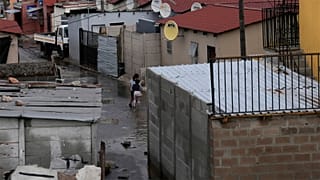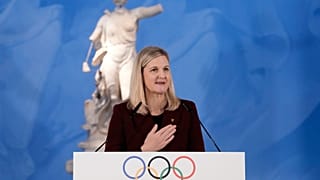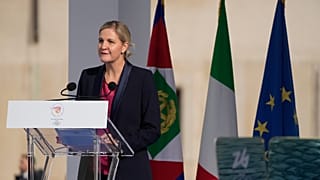Switzerland
Nations gather in Geneva Tuesday to try to complete a landmark treaty aimed at ending the plastic pollution crisis that affects every ecosystem and person on the planet.
It’s the sixth time negotiators are meeting and they hope the last. A key split is whether the treaty should require cutting plastic production, with powerful oil-producing nations opposed; most plastic is made from fossil fuels. They say redesign, recycling and reuse can solve the problem, while other countries and some major companies say that’s not enough.
United Nations Environment Programme Executive Director Inger Andersen said the issues are complex but the crisis is “really spiraling” and there's a narrow pathway to a treaty. She said many countries agree on redesigning plastic products to be recycled and improving waste management, for example.
Between 19 million and 23 million tons of plastic waste leak into aquatic ecosystems annually, that could jump 50% by 2040 without urgent action, according to the UN.
In March 2022, 175 nations agreed to make the first legally binding treaty on plastics pollution by the end of 2024. It was to address the full life cycle of plastic, including production, design and disposal.
Talks last year in South Korea were supposed to be the final round, but they adjourned in December at an impasse over cutting production. Every year, the world makes more than 400 million tons of new plastic, and that could grow by about 70% by 2040 without policy changes.
About 100 countries want to limit production as well as tackle cleanup and recycling. Many have said it's essential to address toxic chemicals.
Panama led an effort in South Korea to address production in the treaty. Negotiator Debbra Cisneros said they'll do so again in Geneva because they strongly believe in addressing pollution at the source, not just through downstream measures like waste management.
About 300 businesses that are members of the Business Coalition for a Global Plastics Treaty — companies such as Walmart, the Coca-Cola Company, PepsiCo, and L’Oréal — support reducing production along with increasing recycling and reuse. The coalition includes major food and beverage companies and retailers who want an effective, binding treaty with global rules to spare them the headaches of differing approaches in different countries.
Some plastic-producing and oil and gas countries firmly oppose production limits. Saudi Arabia, the world's largest exporter of one common type of plastic, has led that group in asserting there should be no problem producing plastic if the world addresses plastic pollution.
The U.S. doesn’t support global production caps or bans on certain plastic products or chemical additives to them.
The State Department says it supports provisions to improve waste collection and management, improve product design and drive recycling, reuse and other efforts to cut the plastic dumped into the environment.
That’s similar to the views of the plastics industry, which says that a production cap could have unintended consequences, such as raising the cost of plastics, and that chemicals are best regulated elsewhere.
China, the United States and Germany lead the global plastics trade by exports and imports, according to the Plastics Industry Association.
For any proposal to make it into the treaty, every nation must agree. Some countries want to change the process so decisions may be made by a vote if necessary. India, Saudi Arabia, Iran, Kuwait and others have opposed that, arguing consensus is vital to an effective treaty.
Tracey Campbell, an executive vice president at the plastics and chemicals company LyondellBasell and vice chair of the executive committee of the World Plastics Council, said she'll ask negotiators to “find a way to agree on a few things and get started” and then build from there.
She suggested tackling things like product redesign, recycled content mandates and financing waste collection, waste sorting and recycling technologies.
In contrast, Greenpeace will be in Geneva calling for at least a 75% reduction in plastic production by 2040.
Delegates from most countries, the plastics industry and businesses that use plastics, environmentalists, scientists, Indigenous leaders and communities affected by plastic pollution are in Geneva. About 80 government ministers are attending talks that will last 10 days — the longest session yet, with adjournment scheduled for Aug. 14.













01:40
UN Finds dire conditions on first visit to Sudan’s el-Fasher since its fall
01:33
UN Security Council divided over Israel’s recognition of Somaliland
02:01
UN Chief urges world leaders to choose peace over war in new year message
02:31
Plastic pollution threatens Lake Malawi’s unique fish
01:00
Sarajevo faces severe pollution and fog, residents advised to stay indoors
01:14
CAR deploys armed forces and MINUSCA to secure elections